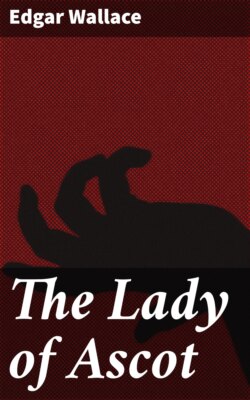Читать книгу The Lady of Ascot - Edgar Wallace - Страница 6
На сайте Литреса книга снята с продажи.
CHAPTER IV
ОглавлениеTable of Contents
HE strolled down into the broad parade, with its avenue of elms and its pleasant shops, and passed the morning looking into windows at objects he did not see, his mind completely occupied by a vision of beauty which had swept him off his feet. He had remembered in a dim way that the girl was pretty, but she was now at an age when the changing lights and colours of youth are focused to perfection. Women meant very little to him; if he was not wholly absorbed with his work and his sport, little had come into his life to divert him to the pleasanter paths.
"I was a fool to come here, and a fool to see her," he said, and the faded old lady to whom he found himself addressing his remarks edged away in alarm.
John discovered that he had been sharing with her a view of a shop window entirely devoted to the more intimate garments of femininity.
All the way back to Town he was turning over the problem which Julian Lester had unconsciously set him. He was a shrewd judge of human nature, and if there was one thing more certain than another in his mind, it was that Mrs. Carawood was an honest woman. There was no reason in the world why the girl should have been left with any money at all. If a search had been made for the will of her late mother, it was equally certain that Julian would have made deeper investigations to discover the properties which had fallen into the hands of Mrs. Carawood.
It was late when he got back to Town. He had dined on the train, otherwise he would have dressed and gone out. Instead, he put on an old smoking-jacket and a pair of slippers and settled down with a book to pass the hours that separated him from bedtime.
But no book, however exciting, could have held his attention that night. Presently he put it down and began to get in order the possibilities of Mrs. Carawood's conduct. So doing, there was a ring at the outer door, and his one manservant entered to announce the last person in the world John Morlay wished to see.
"Sorry to interrupt you, dear old man," said Julian, as he came in with his mechanical smile, and he evidently felt an apology was necessary for his resplendent evening-dress. "I've been dining with the Weirs," he said. "I called you up to ask you, but you were out. Your clock right? Ten, eh?"
He had laid his coat carefully on the end of the settee, and sat down as carefully in the most comfortable chair the room held.
"You went to Cheltenham, they tell me! Good egg! I thought from your deucedly unpleasant manner you weren't going to take up this case."
"My deucedly unpleasant manner betrayed the truth," said Mr. Morlay, "because I'm not!"
Lester's eyebrows rose.
"You aren't helping me?" he asked in dismay.
"I will help you to this extent," said John slowly. "Mrs. Carawood is, I am convinced, a perfectly honest woman. If Marie Fioli has any property, it is as safe in her hands as if it were in the Bank of England."
Julian smiled.
"Really, my dear fellow, for a man with your vast experience of human nature—" he began.
"My vast experience of human nature," interrupted his host, "has so far enabled me to detect a crook, male or female, whenever I have met them. If this woman isn't an honest woman, then I'm greatly at fault."
"Did you question her?" asked Julian.
John Morlay filled his pipe and grinned.
"Oh, surely! I put her to the torture, and she admitted she was honest! Of course I didn't question her. I met her by accident. The accident was of my own devising."
"Did you see Marie?" asked the other eagerly.
"Yes," John nodded, "I saw Marie."
"What do you think of her?"
"I think she's..." he hesitated, "very, very sweet. Moreover, I think she's much too good for you, Julian."
Julian was not by any means disconcerted. All his life people had been rude to him.
"Very likely," he said with a laugh. "Everybody's too good for everybody, if it comes to that, my dear man. And, after all, John, I did not employ you to discover her superior spiritual qualities—"
"To be exact," John interrupted him again, "you did not employ me at all. A whim took me to Cheltenham—I tell you I am not taking up the case."
Julian sighed.
"Then I must get somebody else," he said in aggrieved tones. "I really think you've treated me rather badly, John. People say you are so terribly clever in worming out other people's secrets that I thought you'd jump at this job. If it is a question of fees—"
"It isn't a question of fees at all," said John; "it is a question of principle. I do not take that kind of case, in the first place—secondly, I do not spy upon young girls and their guardians. Why don't you see Mrs. Carawood and ask her point-blank where the girl's money is invested?"
"Because she'd tell me a lie—and her suspicions would be aroused. What an absurd question to ask me!"
"I suppose it is." John pulled at his long upper lip thoughtfully.
"You won't touch the case?"
"Not with a twenty-foot pole," said the other emphatically, and Julian sighed again.
"If you were a lady's man I should think you were in love with Marie," he said banteringly.
"I'm not a lady's man," said John shortly, and opened the door for his visitor.
